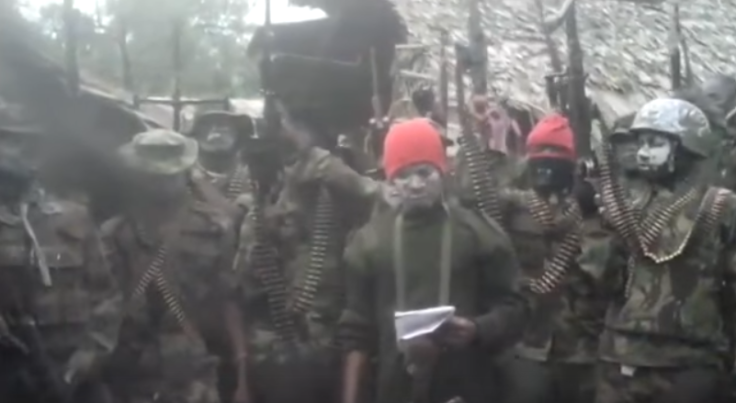Niger Delta leaders say Bakassi Question must be addressed to achieve peace
President Buhari meets Niger Delta leader and militants to discuss solutions to renewed violence.
Nigerian President Muhammadu Buhari has met officials and militant leaders from countries in the the oil-rich Niger Delta to discuss solutions to renewed violence in the area. Leaders from the Delta presented a 16-point proposal to resolve renewed violence.
The high-profile meeting took place in the federal capital of Abuja on 1 November, as attacks on oil and gas facilities, mainly by the Niger Delta Avengers (NDA) group, have brought Nigeria's oil production to a 30-year low.
The group, which says it fights to end disenfranchisement of impoverished communities in the Delta and obtain greater shares of oil revenues, vowed to bring the country's oil production down "to zero".
The 16-point document calls, among other things, on the full implementation of the amnesty programme to reintegrate ex-militants in communities, assist displaced people, improving infrastructure and clean-up territories damaged by repeated oil spills.
Buhari welcomed the 16-point request, but claimed leaders in the Delta "had more to do" to ensure peace, given their influence on militant groups in the area.
The Bakassi Question
Delta leaders also urged the federal government to find a solution to the so-called "Bakassi Question", referring to the Bakassi peninsula on the Gulf of Guinea that Nigeria ceded to Cameroon.
The territory was ceded under the Greentree Agreement, signed to resolve territorial disputes between Nigeria and Cameroon.
The International Court of Justice at the Hague ruled, in 2002, the peninsula belonged to Cameroon as per Anglo-German agreements made during colonisation. The court urged Nigeria to withdraw from the territories that fell within Cameroonian sovereignty.
The decision caused widespread outrage and consternation in Nigeria, which initially opposed the ruling. Escalating tensions culminated with the declaration of the Independent Democratic Republic of Bakassi in 2006, a move condemned by the then ruler of Bakassi, Etinyin Okon Edet.
The declaration was made by the Bakassi Movement for Self-Determination (BAMOSD) militant organisation, which, in 2008, made a similar declaration.
Following talks between Nigeria and Cameroon, mediated by the then UN Secretary General Kofi Annan, Nigeria eventually ceded the peninsula in 2008.

Militancy
BAMOSD is believed to be still active in the region. In 2008 the group claimed responsibilty for the kidnapping of 10 crew members of a French vessel. In 2012, the group, once again, made a declaration of secession.
16 points to focus on for peace in Niger Delta
1. The Presidential Amnesty Programme.
2. Law and justice issues
3. The effect of increased military presence in the Niger Delta
4. Plight of internally displaced persons
5. Ogoni clean-up and environmental remediation
6. The Maritime University Issue
7. Key regional critical infrastructure
8. Security surveillance and protection of oil and gas infrastructure
9. Relocation of Administrative and Operational Headquarters of IOCs
10. Power supply
11. Economic development and empowerment
12. Inclusive participation in oil industry and ownership of oil blocs
13. Restructuring and funding of the Niger Delta Development Commission,(NDDC)
14. Restructuring the Niger Delta Ministry
15. The Bakassi Question
16. Fiscal federalism
BAMOSD has been linked to the Movement for the Emancipation of the Niger Delta (Mend), currently one of Delta's largest militant groups. Mend advocates for a greater share of oil revenues and compensation following environmental damages caused by oil spills.
Earlier this year, another militant group active in the Delta, the Bakassi Strike Force (BSF), was created. The group, which denies any involvement in oil facilities attacks, says it advocates for the recognition of human rights of people living in the Bakassi.
Grievances
Some have claimed the Nigerian government has not created a comprehensive resettlement plan for people in the Bakassi region who were displaced when the land was ceded to Cameroon.
People have also claimed "returnees" live like refugees in their own land, after being forcefully evicted from their ancestral land.
A BSF leader, Simply Benjamin, said during the meeting on the Delta crisis the group is willing to lay down arms if "concerns of Bakassi returnees are addressed".
"Our grievance against the federal government has to do with the way Nigeria ceded our ancestral land to Cameroon without recourse to the feelings and rights of the people to self-determination," Benjamin was quoted by the Premium Times as saying.
"Under the Greentree agreement, there were steps to be taken to ensure that the fundamental rights of the returnees were protected but the government has not fulfilled its obligations under the agreement.
The group called for new negotiations to be monitored by the international community, which it said should ensure Bakassi people could play a large role.
Birth of militants in Niger Delta
Militant groups in the oil-rich Niger Delta region took hold in the early 2000s following the deterioration of living conditions blamed on the increase of oil-related activities by foreign exploration corporations. Tensions flared up in the local communities as some ethnic groups felt they were being exploited and did not benefit from the crude oil on their land.
The repeated oil spills that considerably damaged the environment and affected people's health further deepened the communities' frustrations. After being elected in 2015, Buhari extended a 2009 amnesty granted to 30,000 former militants in the area.
Nigeria up close: Check out our Flipboard magazine
© Copyright IBTimes 2024. All rights reserved.






